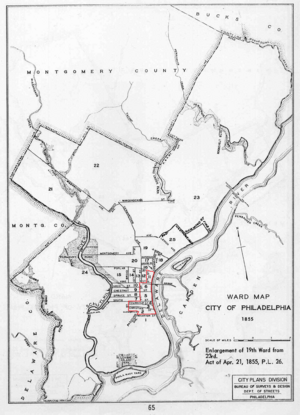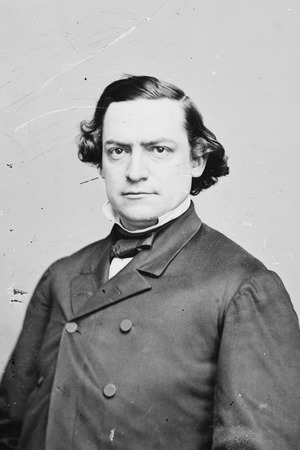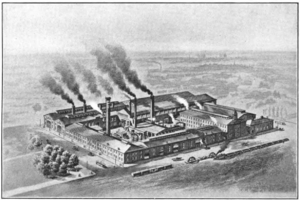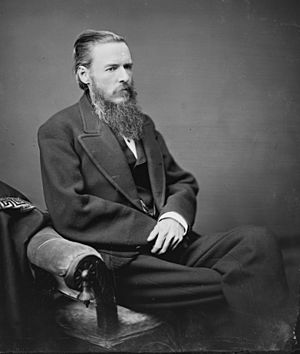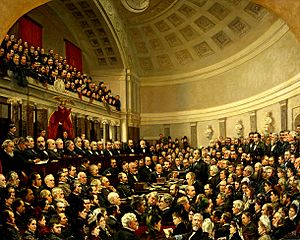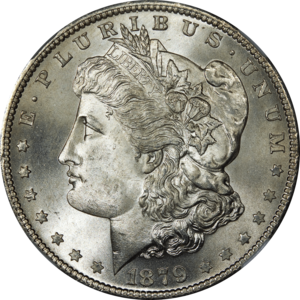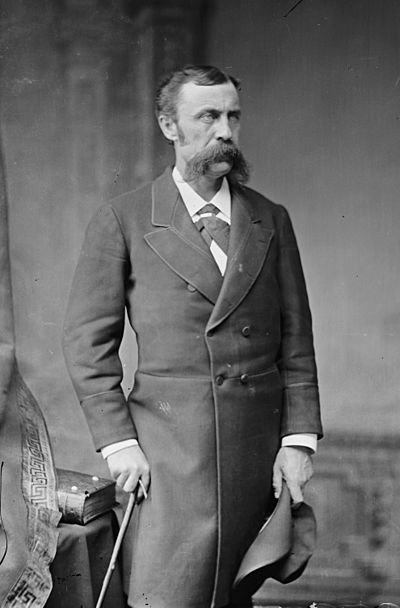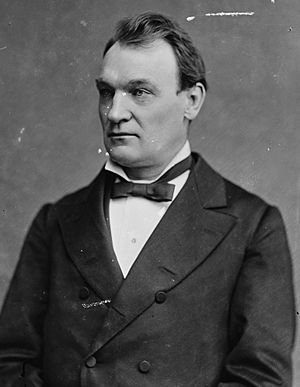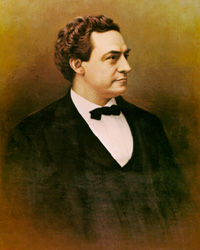Samuel J. Randall facts for kids
Quick facts for kids
Samuel J. Randall
|
|
|---|---|
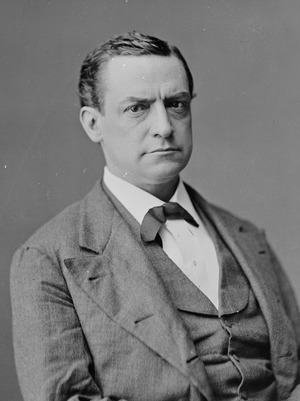 |
|
| 29th Speaker of the United States House of Representatives | |
| In office December 4, 1876 – March 3, 1881 |
|
| Preceded by | Michael C. Kerr |
| Succeeded by | J. Warren Keifer |
| Leader of the House Democratic Caucus | |
| In office March 4, 1869 – March 3, 1871 Serving with William E. Niblack
|
|
| Preceded by | George S. Houston (1861) |
| Succeeded by | William E. Niblack (1873) |
| Member of the U.S. House of Representatives from Pennsylvania |
|
| In office March 4, 1875 – April 13, 1890 |
|
| Preceded by | Leonard Myers |
| Succeeded by | Richard Vaux |
| Constituency | 3rd district |
| In office March 4, 1863 – March 3, 1875 |
|
| Preceded by | William Eckart Lehman |
| Succeeded by | Chapman Freeman |
| Constituency | 1st district |
| Member of the Pennsylvania Senate from the 1st district |
|
| In office 1857–1859 |
|
| Preceded by | Isaac Nathaniel Marselis |
| Succeeded by | Richardson L. Wright |
| Personal details | |
| Born |
Samuel Jackson Randall
October 10, 1828 Philadelphia, Pennsylvania, U.S. |
| Died | April 13, 1890 (aged 61) Washington, D.C., U.S. |
| Resting place | Laurel Hill Cemetery, Philadelphia, Pennsylvania |
| Nationality | American |
| Political party | Whig Democratic |
| Spouse | Fannie Agnes Ward |
| Occupation | Politician |
| Signature | |
| Military service | |
| Allegiance | United States Union |
| Branch/service | Union Army |
| Years of service | 1861; 1863 |
| Rank | Captain |
| Unit | First Troop Philadelphia City Cavalry |
| Battles/wars | American Civil War |
Samuel Jackson Randall (October 10, 1828 – April 13, 1890) was an American politician. He represented parts of Philadelphia, Pennsylvania, in the United States House of Representatives from 1863 to 1890. He also served as the Speaker of the House from 1876 to 1881. Randall was considered a possible candidate for president in 1880 and 1884.
Born into a political family, Randall first joined the Whig Party. Later, he became a Democrat. He started his political career in the 1850s. He was elected to the Philadelphia Common Council and then to the Pennsylvania State Senate. During the American Civil War, Randall served in a Union cavalry unit. After the war, he won a seat in the U.S. House of Representatives. He was re-elected many times until his death.
Randall was known for supporting protective tariffs. These are taxes on imported goods that help local businesses. While he often agreed with Republicans on tariffs, he disagreed with their plans for Reconstruction after the Civil War. He also opposed the growth of federal power. His views made him popular among House Democrats. They chose him as Speaker in 1876. He held this important position until 1881.
Over time, Randall's strong support for high tariffs made him different from most Democrats. When Democrats regained control of the House in 1883, he was not chosen as Speaker again. He continued to serve in Congress. He led the Appropriations Committee. Randall remained a respected leader, but his influence lessened as his party favored free trade. His health also declined until his death in 1890.
Contents
Early Life and Family Background
Samuel Randall was born in Philadelphia on October 10, 1828. He was the oldest son of Josiah and Ann Worrell Randall. His father, Josiah, was a well-known lawyer in Philadelphia. He had also served in the state legislature.
Randall's family had a history in politics. His grandfather, Matthew Randall, was a judge. His other grandfather, Joseph Worrell, was active in the Democratic Party. Samuel's father was a Whig, but he later became a Democrat.
The Randall family lived in Center City Philadelphia. Samuel went to the University Academy, a school connected to the University of Pennsylvania. After school, at age 17, he became a bookkeeper. He later started a coal delivery business. At 21, he became a partner in a scrap iron business.
In 1851, Randall married Fannie Agnes Ward. Her father, Aaron Ward, was a major general and a former Congressman. Samuel and Fannie had three children: Ann, Susan, and Samuel Josiah.
Starting in Politics and Military Service
Randall began his political career in 1851. He helped his father with a local judge's election. The next year, he ran for the Philadelphia Common Council. He was elected and served four one-year terms. During this time, many towns and boroughs in Philadelphia County joined together to form one large city.
As the Whig Party became weaker, Randall and his family joined the Democrats. In 1856, Randall and his father supported James Buchanan for president. Buchanan won the nomination and later the presidency.
In 1858, Randall was elected to the Pennsylvania State Senate. He was only 30 years old. In the state Senate, he worked on laws for street railway companies. He also supported laws to limit the power of banks. This was a belief he held throughout his career.
When the American Civil War started in 1861, Randall joined the First Troop Philadelphia City Cavalry. He served as a private for 90 days. In 1863, he rejoined the unit and was elected captain. He served as a provost marshal near Gettysburg, Pennsylvania, but did not see direct combat. His military service was mostly routine duties.
Joining the House of Representatives
First Election to Congress
In 1862, Samuel Randall was elected to the United States House of Representatives. He represented Pennsylvania's 1st congressional district. This district was designed to include many Democrats. So, winning the Democratic nomination usually meant winning the election. Randall easily won against his Republican opponent.
He started his work in Congress in December 1863. Republicans controlled Congress at the time. As a member of the minority party, Randall couldn't write many laws. However, he quickly became known as a hard-working member. He was a strong supporter of his party.
Randall was known for helping manufacturers in his district. He strongly supported protective tariffs. These tariffs made foreign goods more expensive. This helped local factories and workers. He often spoke out for his constituents' interests.
War and Reconstruction Policies
When Congress met in 1863, the Civil War was nearing its end. Randall was a "War Democrat." This meant he sometimes voted with Republicans to support the war effort. For example, he voted to promote Ulysses S. Grant to lieutenant general. However, he opposed allowing black men to serve in the Union Army.
After the war, Randall disagreed with most Republican plans for Reconstruction. He supported President Andrew Johnson's more lenient policies for the South. In 1867, Republicans proposed a strict oath for Southerners. Randall led a long debate against it, but it still passed.
Randall gained importance among Democrats by opposing Reconstruction. He spoke against the Fourteenth Amendment. However, he did agree with one part of it. This part said that the government must pay its debts. He also said the government should not pay the debts of the Confederate states.
When Congress tried to impeach President Johnson, Randall was one of his main defenders. He tried to guide the investigation to a fair committee. His efforts were unsuccessful, and Johnson was impeached. However, Johnson was not removed from office by the Senate.
Focus on Money and Spending
With Republicans in control, Randall focused on financial issues. He served on the Banking and Currency Committee. He continued to oppose the power of banks. He also got involved in the debate over the nation's money. Some wanted "hard money" (backed by gold). Others wanted "soft money" (more paper money or silver coins). Randall favored gold-backed money but was also friendly to paper money.
Randall worked with Republicans to get federal money from tariffs instead of taxes. He believed taxes on alcohol and income were unfair. He helped pass a rule that required large tax refund cases to go to federal court. He also worked to remove taxes on tea, coffee, cigars, and matches. He thought these taxes hurt poor people. By relying more on tariffs, he helped industries and workers in his district.
Randall generally supported high tariffs. He believed they helped workers by making foreign goods more expensive. He called his approach "incidental protection." This meant tariffs should be high enough to fund the government. They should also protect industries that needed help against foreign competition.
Looking into Government Spending
While Democrats were in the minority, Randall spent a lot of time checking Republican spending bills. He questioned many items in these bills. He often got Republicans to agree to cut unnecessary spending. He also proposed a law to stop government departments from spending more than they were given. This law passed. He also tried to stop land grants to private companies, but he was unsuccessful.
Randall's work on spending led him to investigate corruption. He was involved in the Crédit Mobilier of America scandal. This scandal involved the Union Pacific Railroad overpaying its own construction company. Some congressmen had also bought shares at low prices. Randall tried to ban such frauds. He also tried to impeach Vice President Schuyler Colfax due to the scandal.
In 1873, Congress voted for a pay raise for its members. This raise was also for past work. Randall voted for it. This law, called the Salary Grab Act, made many people angry. Randall defended it, saying it would reduce fraud. However, the next Congress quickly repealed it. Randall voted for the repeal.
Becoming a Prominent Leader
Democrats gained control of the House in 1875. Randall was considered for Speaker. However, some worried he was too close to railroad interests. His vote on the Salary Grab Act also hurt him. Instead, Michael C. Kerr of Indiana was elected Speaker.
Randall became chairman of the Appropriations Committee. In this role, he worked to reduce government spending. He cut the budget by $30 million. Kerr's health was poor, and he often missed sessions. Randall focused on his committee work. Kerr died in August 1876, leaving the Speakership open again.
Serving as Speaker of the House
The Disputed 1876 Election
After Kerr's death, Randall was chosen as Speaker on December 2, 1876. This was a very tense time. The presidential election had just happened, and there was no clear winner. The Democrat, Samuel J. Tilden, was one vote short of winning. The Republican, Rutherford B. Hayes, had fewer votes. Twenty-two votes were disputed.
Randall supported creating an Electoral Commission. This group would decide the disputed votes. He believed it was the best solution. The commission had an 8-7 Republican majority. It awarded all disputed votes to Hayes.
Many Democrats were angry and wanted to stop the final vote count. Randall allowed delays in the House. As the inauguration day approached, leaders from both parties met. They agreed to a compromise. Republicans promised to remove federal troops from the South. In return, Democrats agreed to accept Hayes as president. Randall and other Democratic leaders agreed, and the delays ended.
Debates Over Money
Randall was reelected Speaker in March 1877. Many Democrats wanted to cancel the Specie Payment Resumption Act. This act aimed to replace paper money with gold or silver-backed dollars. Randall had voted against it in 1875. He allowed the House to vote on its repeal, which passed. However, the Republican-controlled Senate did not act on it.
The debate over silver continued. A bill was proposed to make the government buy silver and turn it into coins. This would increase the money supply. Randall allowed the bill to be voted on. It passed easily. President Hayes vetoed the bill, but Congress overrode the veto. The Bland–Allison Act became law.
Investigating the 1876 Election
As the 1880 presidential election neared, many Democrats still felt Tilden had been cheated in 1876. A committee was formed to investigate the 1876 election in Florida and Louisiana. Randall supported this idea. He hoped it would hurt the Republican candidate in 1880.
However, the investigation uncovered telegrams from Tilden's nephew. These telegrams showed offers of bribes to Republicans in the disputed states. This discovery worked against the Democrats' goal. The excitement around the investigation faded.
Reelected Speaker Again
When the 46th Congress met in 1879, Democrats still had the most seats. However, many Democrats disagreed with Randall on tariffs. They considered choosing Joseph Clay Stiles Blackburn as Speaker instead. In the end, Randall was chosen as the Democratic nominee. Republicans and other parties could not agree on a candidate. So, Randall and the Democrats organized the House again.
Civil Rights and the Army
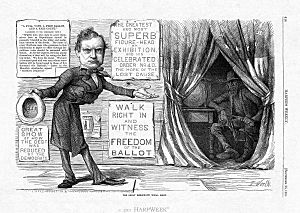
Randall wanted to cut spending. Southern Democrats wanted to reduce federal power in their states. This led the House to pass a bill to fund the army. It included a change that would cancel the Enforcement Acts. These acts had been used to stop groups like the Ku Klux Klan.
President Hayes wanted to protect black voters. He vetoed the bill. Democrats did not have enough votes to override the veto. They passed similar bills, and Hayes vetoed them each time. Finally, Hayes signed a bill without the change. However, Congress refused to fund federal marshals. These marshals were important for enforcing the acts. Randall's role was limited, but the Democrats' failure weakened his chances for president in 1880.
The 1880 Presidential Election
As the 1880 elections approached, Randall had two goals. He wanted more control of the Pennsylvania Democratic Party. He also wanted Tilden to be nominated for president. He worked to gain support in his home state. However, his allies sometimes caused trouble.
At the state convention in April 1880, Randall's opponents had more power. Despite this, Randall continued to support Tilden for president. Tilden later withdrew his name. Randall hoped to gain support from Tilden's delegates. He came in second place on the second vote. However, the nomination went to Winfield Scott Hancock.
Randall felt betrayed by some who he thought would support him. But he still campaigned for Hancock. He gave speeches in many states. However, Hancock lost to James A. Garfield. Garfield's victory also meant Republicans gained control of the House. Randall's time as Speaker was over.
Later Years in Congress
When Randall returned to Congress in 1881, Republicans were in control. After President Garfield was assassinated, Chester A. Arthur became president. Arthur, like most Republicans, favored high tariffs. Randall supported Arthur's plan to simplify tariffs and reduce some taxes.
Democrats won back the House in 1882. However, the new Democratic majority was divided on tariffs. Randall's group, which favored protectionism, was now a minority. Many new members wanted a Speaker who agreed with their views. John G. Carlisle, who supported tariff reform, was chosen over Randall.
Carlisle allowed Randall to remain in charge of the Appropriations Committee. Randall continued to oppose tariff reductions. He often voted with Republicans on these issues. This showed how isolated his views were within his own party.
The 1884 Presidential Election
In 1884, Tilden again decided not to run for president. Randall considered running himself. However, most of Tilden's supporters chose New York governor Grover Cleveland. Randall's delegates eventually voted for Cleveland. It is believed Randall was promised control over federal jobs in Pennsylvania if Cleveland won.
Randall campaigned for Cleveland. He gave speeches in many states. He tried to assure voters that Democrats would not lower tariffs so much that people would lose jobs. Cleveland won the election against Republican James G. Blaine.
Fighting Tariff Reform
When Congress met in 1885, Cleveland's stance on tariffs was still unclear. Randall did not challenge Carlisle for Speaker. He focused on his role on the Appropriations Committee. He also worked on federal job appointments in Pennsylvania.
Randall continued to oppose efforts to reduce tariffs. He often joined Republicans to defeat such measures. He even tried to propose a compromise tariff bill. It would remove taxes on some raw materials and some liquors. But Republicans and most Democrats rejected it.
Declining Influence and Death
The tariff debate continued into the 50th Congress in 1887. Cleveland openly supported tariff reform. A new bill was introduced to cut tariffs on raw materials and manufactured goods. Randall, representing a manufacturing district, opposed it. He was ill and absent when the bill passed the House. However, the Republican-controlled Senate refused to consider it.
Randall's views on tariffs made him seem like a Republican to some. Only a few Democrats voted with him against tariff reductions. His own state party also turned against his protectionist ideas. He also voted with Republicans to try to override Cleveland's veto of a pension bill for Union veterans. This further distanced him from his fellow Democrats.
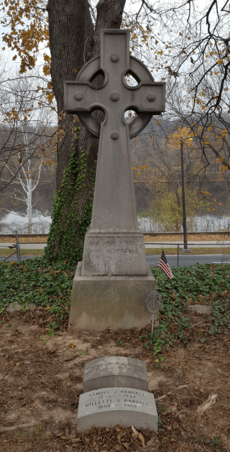
Randall's health continued to worsen. When the new Congress began in 1889, he was sworn in from his bed. He was appointed to committees but had little impact.
Samuel J. Randall died on April 13, 1890, from colon cancer. He was buried in Laurel Hill Cemetery in Philadelphia. Randall was the only major Democrat who was continuously active in national politics from 1862 to 1888. People remembered him as a man of common sense, courage, and hard work.
Images for kids
 | Chris Smalls |
 | Fred Hampton |
 | Ralph Abernathy |


